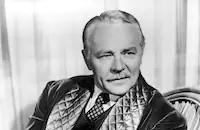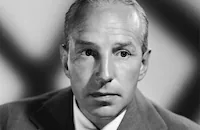Exclusive
Cast & Crew
Alexander Hall
Fred Macmurray
Frances Farmer
Charles Ruggles
Lloyd Nolan
Fay Holden
Film Details
Technical Specs

Synopsis
When Mountain City racketeer Charles Gillette is acquitted, he arrives at the Mountain City World newsroom and vows revenge on the Better Government Committee who put him behind bars. Members of the committee include Colonel Bogardus, owner of the World , Horace Mitchell, a candidate for mayor, and Mr. Franklin, a department store owner. First Gillette buys a rival newspaper, the Sentinel , and offers a pricey editorship to World newsman Ralph Houston, who refuses the offer on principle. That evening, Ralph and his partner, Tod Swain, are greeted at home by a creditor, and Vina Swain, Ralph's fiancée, is furious to find out he turned down Gillette's offer. When she learns Ralph went into debt to put her through college, she warns Gillette of a police raid and pays back Ralph's debt with Gillette's renumeration. When Ralph orders Vina not to work for Gillette, she breaks their engagement. Gillette then terrorizes city shopkeepers and newsstands into advertising in the Sentinel and assigns Vina to find evidence of scandal in Mitchell's house, which would damage his reputation. Vina then prints a story that names Mitchell as an ex-convict and ruins his political career. Tod tells Vina that the World previously had refrained from printing the story because Mitchell's public service record had proved him a good man. Mitchell then kills himself in front of Vina, and Tod, to teach her a lesson, prints an article that blames Vina for Mitchell's death. Gillette's next target, Mr. Franklin, is accused of having antiquated elevators in his store, and sues the Sentinel for libel. The World then stages a public safety test of the elevators, and Gillette's henchman, Beak McArdle, who wears a cameo ring, greases the elevator cables, hoping to sabotage the test. The accident occurs after the test, however, and a few people are killed and Ralph is injured. Hearing of Ralph's injury, Gillette rushes Vina out of town on assignment with McArdle, who then receives orders from Gillette to kill her. When Ralph arrives at the Swains' delirious, Tod figures out Gillette's part in the accident and rushes to save Vina. Pretending to be drunk, Tod tells McArdle he found his ring in a grease can at the store and forces a confession that indicts Gillette. Tod then has McArdle arrested, and Gillette's men chase Vina and Tod's car. Tod is shot, but drives Vina safely to the World newsroom, where he finishes his story and dies. The colonel then announces his sale of the World to Gillette. The next day, when headlines blame Gillette for the elevator murders, townspeople storm the Sentinel headquarters and Gillette is finally apprehended. Franklin and the Better Government Committee then buy the World and put the recovered Ralph in charge.

Director

Alexander Hall
Cast

Fred Macmurray

Frances Farmer

Charles Ruggles

Lloyd Nolan

Fay Holden

Ralph Morgan
Edward H. Robins
Harlan Briggs
Willard Robertson
Horace Macmahon
William Mansell
Gaylord Pendleton
Chester Clute

Irving Bacon
Frank Bruno
James Blakeley
Sam Hayes
Bennie Bartlett
Mack Gray
Edward Churchill
John Kelly
Richard Allen
Edward Hearn
Jack Daley
Dick Rush
Mariska Aldrich
Antrim Short
Frances Morris
Billy Lee
Pat West
Sam Ash
Charlene Wyatt
Almeda Fowler
Spec O'donnell
Ann Marsters
Billy Arnold
Hubbard Keavy
Clark Wales
Paul Harrison
Erskine Johnson
Harold Heffernan
Jack Chapin
Oscar G. Hendrian
Harry Hayden
Joseph De Stephani
Ray Turner

Frank Puglia
Joe Cunningham
Frank Hammond
Libby Taylor

Bill Franey
Jack Cheatham
Dick Baldry
Alfred Sears
Freddie Lord
Jimmie Dime
Tex Higginson
Margaret Fealy
Carol Holloway
Lou Salter
James Quinn
Robert E. Milasch

Max Davidson
Gertrude Simpson
Ricca Allen
Ethel Clayton
Gloria Williams
Crew
Hans Dreier
Ernst Fegté
A. E. Freudeman
Benjamin Glazer
Edith Head
Rian James
William C. Mellor
Louis Mesenkop
John C. Moffitt
Boris Morros
Walter Oberst
Sidney Salkow
Paul Weatherwax

Film Details
Technical Specs

Quotes
Trivia
Notes
According to a March 11, 1937 Hollywood Reporter news item, this film's title originally was Exclusive and was temporarily changed to Things Began to Happen. Although a 1937 copyright statement is listed on the viewed print, the title is not listed in the copyright register. A news item in Hollywood Reporter on March 13, 1937 states that director Alexander Hall and producer Benjamin Glazer left the previous evening for Richmond, near Tanforan, CA, to scout waterfront locations for this film, although it is unclear where the location shooting actually took place. Numerous reviews mentioned cast members' affiliation with newspapers: John C. Moffitt worked for the Kansas City Star, Benjamin Glazer was part of the old Philadelphia Press, and Rian James was employed by the Brooklyn Daily Eagle. This story May have been inspired by the real-life political scandal that was going on in Los Angeles at the time of the production involving Mayor Frank Shaw, who was investigated by Clifford Clinton and his C.I.V.I.C. Committee (Citizens Independent Vice Investigating Committee). The Shaw scandal included rival newspapers the Los Angeles Times and the Citizen News.












